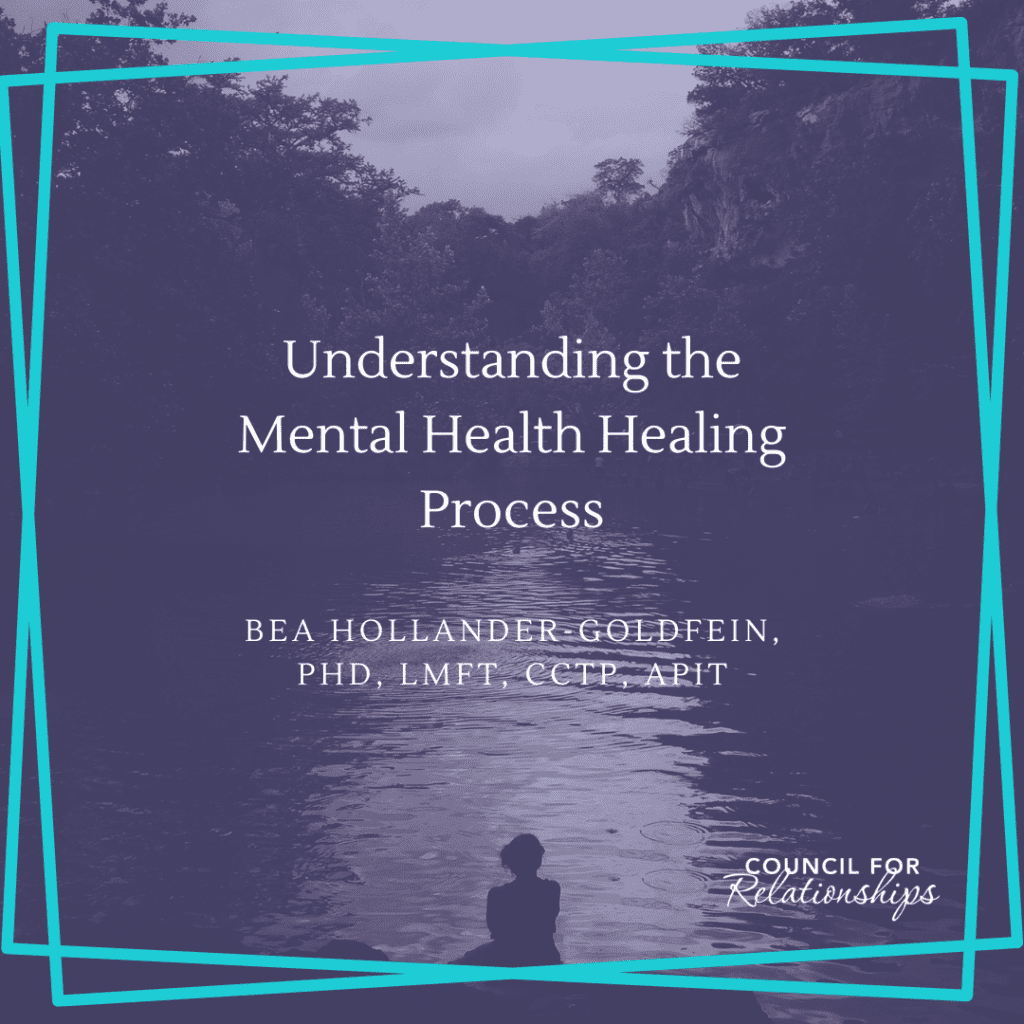Understanding the Mental Health Healing Process
In her new blog, CFR Staff Therapist and Co-Director of the Transcending Trauma Project, Bea Hollander-Goldfein, PhD, LMFT, CCTP, APIT, explores the mental health healing process and its role in achieving emotional well-being.
By reflecting on the nature of therapy, human resilience, and the power of connection, Bea delves into how therapeutic relationships can transform lives. Her insights guide readers through your mental health journey’s challenges, stages, and critical components, offering an inspiring view into personal growth.

Individual, Couples, Family, & Other Relationship therapy appointments are available.
Understanding the Mental Health Healing Process
The Oxford Dictionary defines therapy as “curative medical or psychiatric treatment” and lists many therapeutic practices. Many experiences can be therapeutic, as they support mental health healing by improving emotional and physical well-being.
Psychotherapy formally refers to treating mental health disorders—patterns that disrupt “normal” ways of functioning. These disorders may arise from neurological, biochemical, or emotional factors, which often cause daily struggles. Yet the mental health healing process isn’t limited to disorders; therapists also help individuals without disorders face life’s challenges and improve their well-being.
Life Challenges in the Mental Health Healing Process
Life is full of challenges, shaping the mental health healing process as we grow and learn to cope. Childhood experiences shape adult coping mechanisms and the ways we respond to stress. Traumatic experiences can significantly disrupt one’s ability to cope, making recovery and growth crucial steps in the process of healing your mental health.
Healing from trauma involves reconnecting with one’s prior ability to function and, in some cases, reaching new levels of strength, a journey sometimes called “traumatic growth.” Each person’s journey through the mental health healing process is unique and shaped by past experiences.
Key Aspects of the Mental Health Healing Process
Human development involves emotional, cognitive, behavioral, and visceral growth within the brain. We all know that families shape who we become, both through their strengths and limitations. Early attachments with caregivers lay the groundwork for self-identity and resilience, influencing the healing process.
For many in therapy, the mental health healing process involves addressing current challenges and understanding the root experiences that contribute to them. Therapists may have different approaches, but all aim to support individuals in gaining insight and healing from within.
Core Components of the Mental Health Healing Process
Psychology has identified five central components that support well-being in the mental health healing process:
- Being open to experience – Acknowledging feelings, thoughts, behaviors, and gut responses.
- Meaning-making – Maintaining hope and finding meaning despite life’s inevitable pain and loss.
- Affect-regulation – Managing emotions such as anxiety, fear, and irritability.
- Self-reflective function – Awareness of one’s own experiences and empathy for others.
- Developing these components strengthens mental health healing by enhancing personal resilience and adaptability.
The Role of Connection
Therapists help guide clients through their mental health journey by fostering self-awareness, empathy, emotional regulation, and flexibility. Interpersonal Neurobiology, a field studying social connections, has found that humans are “wired” for interaction, and isolation can negatively impact mental health. Building a strong, empathic therapeutic relationship is essential to accomplishing your mental health goals.
In effective therapy, the “right brain” of both therapist and client connect, creating a powerful, resonant understanding. Neuroscience has identified “mirror neurons” that help us feel in sync with others, a concept illustrated by Dr. Daniel Siegel, a pioneer in Interpersonal Neurobiology. He describes therapy as a place where clients can feel genuinely understood, helping to strengthen the mental health healing process:
“Listening closely to you, your therapist lets you know that she’s really there with you, she feels some of what you’re feeling. She picks up your fear, confusion, despair, but without being overcome by them as you are. As a result, you ‘feel felt’ through nonverbal signals and mirror neurons and you ‘see yourself’ in her, allowing you to realize that you’re authentically in her mind, and this changes your experience of the moment.”
Being part of this mental health healing process as a therapist is profound. Witnessing the release of a person’s potential for profound, lasting change—known as “second-order change”—is truly inspiring.

Contact Dr. Hollander-Goldfein.
About Wynnewood, PA, Therapist Bea Hollander-Goldfein, PhD, LMFT, CCTP, APIT
Bea Hollander-Goldfein, PhD, LMFT, CCTP, APIT, is a Staff Therapist at Council for Relationships and the Co-Director of CFR’s Transcending Trauma Project. She specializes in helping college students, young adults, and adults with issues such as anxiety disorder, infidelity, communication, sexual difficulties, and trauma.
Bea offers therapy services in Pennsylvania. If you or a friend or family member is ready to start your mental health healing process, request an appointment with Bea today.
Your mental health is essential to us. If you are looking for individual, couples, or family therapy or psychiatry services, click here to request an appointment. See our Therapist & Psychiatrist Directory for additional CFR therapists or psychiatrists near you.
If this is an emergency, dial 9-1-1.
More Expert Voices
Looking for more ways to support your mental health healing process while managing stress and anxiety? CFR’s therapists and mental health experts provide valuable insights on mental health topics that impact your life. Explore the CFR Expert Voices blog for more mental health tips and advice on building and managing relationships with family and friends, practicing mindfulness, addressing eating disorders, reducing stress, and maintaining self-care routines, and much more.
Whether you’re looking for strategies to handle overwhelming situations or enhance your mental well-being, our experts offer practical solutions to support your mental health journey and help you and your relationships thrive. Our therapists and psychiatrists are here to provide you with the best mental health support.
Stay informed and receive tips directly to your inbox! Sign up for our mailing list to receive the latest advice on behavioral health, stress management strategies, evidence-based mental health practices, and additional resources to live your best life!
Military Children Mental Health: Navigating the Challenges of Deployment & Relocation
